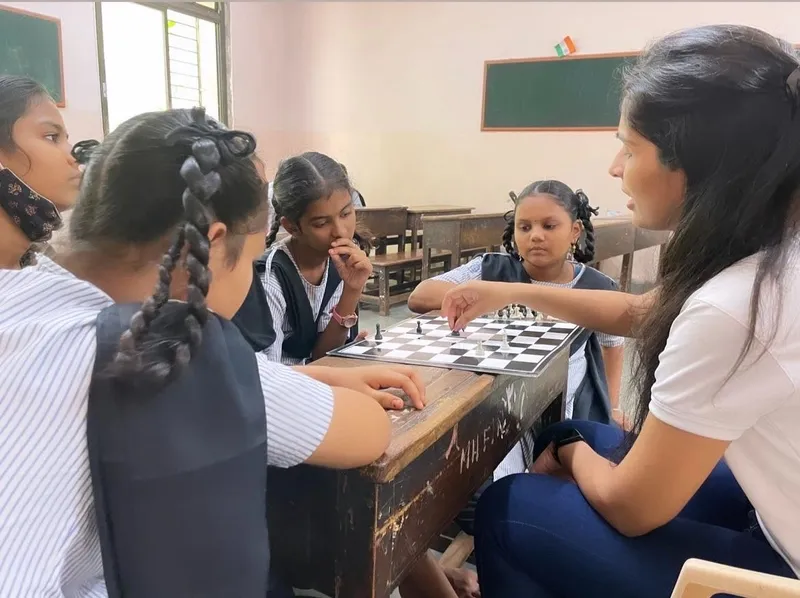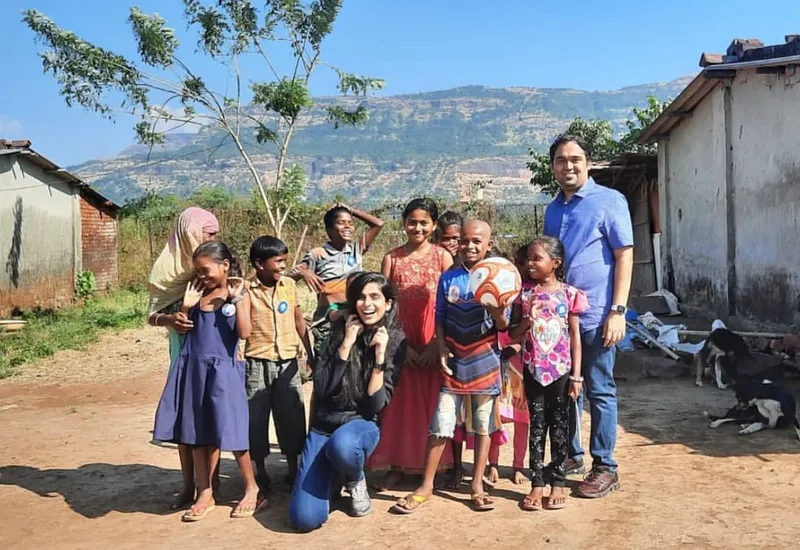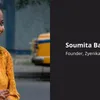The rifle shooter empowering underprivileged children through sports education
Rifle shooter Priyal Keni dons many hats–social entrepreneur, chartered accountant, sportsperson, and now a UN Women ally.
Rifle shooter Priyal Keni first took up the sport in 2008, when she was just 13 years old. When she represented India at her maiden International Shooting Competition in Germany at 16, the visit was eventful in every way.
“According to the laws at that time, as a 16-year-old, I couldn't travel with a licensed firearm. There were a lot of extra permissions that were to be taken by the state association, the national body, and the German authorities to allow someone else to carry my weapon,” recalls Priyal, who used to spend four-five hours every day training at the shooting range.
Holding a 6.5 kg rifle in the scorching heat of Mumbai and working on refining her technique was utterly different to competing in cold and snowy Germany under extremely competitive conditions, but the experience only left her more determined than ever.
Since that first competitive event, Priyal has represented India at several international tournaments, been a part of the Indian Shooting team, and competed in the World University Games and the World Championships. She has won 117 medals so far, and broken three national records.
However, much before she got into sports, Priyal’s experiences with community volunteering had a lasting impression on her growing-up years.
“My school, Bombay Scottish, had a lot of volunteering opportunities and I had the opportunity to be involved. So after I completed my CA studies, I felt like I had the time to look at the social impact sector,” Priyal says.
Getting together with fellow-shooter Sarthak Vani, Priyal launched in 2019, a non-profit aimed at building a sports culture. Through their foundation, Priyal, Sarthak, and a host of other volunteer athletes support, nurture, and mentor students at government schools in Maharashtra through sports. The foundation aims to reach more than one million students by the end of 2023.

Priyal teaches chess to the girls in one of the government schools.
Social impact and sports
“A year before we launched the foundation, Sarthak and I approached a couple of government schools in the vicinity. These schools did not have the facility or infrastructure for dedicated sports lessons for their students. We told them we were sportspersons keen to start an initiative to teach children more about sports, and that we could start with weekly sports sessions,” Priyal recalls.
Although their work started informally and without a solid plan of action, the sheer interest and energy shown by the children spurred the team forward. In 2019, when the foundation was officially launched, Priyal and Sarthak were joined by a network of sportspersons from different fields. The organisation also has on board a psychologist and physiotherapist who volunteer their services when required.
In 2020, Play and Shine Foundation collaborated with Teach for India (TFI) and the Tata Sustainability Group. With the former, Priyal’s organisation launched a sports literacy and sports mentorship programme for children. The programme was specifically designed to contribute to underprivileged children’s physical and cognitive development.
Online impact during COVID
Soon after the tie-up with TFI in 2020, the COVID-19 pandemic broke out.
Terming the period challenging, Priyal says, “We had spoken to a few TFI fellows to start working with their classrooms, but the pandemic kicked in and everything went into a limbo. For two months, we were trying to figure it all out in the face of such looming uncertainty. Then, one day, we decided that if the rest of the education system has moved to an online model, let's try and replicate sports education also into an online model. And that’s how we started online sports education sessions.”
According to her, the sessions were an eye-opener into the level of sports knowledge at the grassroots level.
“The kids we were working with had zero exposure to sports other than cricket. During the evaluation, we found that very few students could name a sportsperson other than Sachin Tendulkar or Virat Kohli. Fewer still could actually name two or more sports that they were aware of,” she says.
With their task cut out, Priyal and her team started by talking to students about various sports and athletics, and eventually covered more than 15 types of sports. “We used to share a lot of inspirational sports stories with them, and also taught them about yoga and meditation.”
Awareness aside, there was also the issue of logistics when it came to the digital literacy of the underprivileged. Working with BMC schools in Mumbai, the team realised that while many children had access to mobile devices, either their own or their parent’s, it was not easy to keep the model going.

Priyal and fellow rifle champion and co-founder of Play and Shine Foundation, Sarthak Vani, with children from rural Maharashtra.
“We rolled out a survey asking what day and time of the week worked for everyone, and weekends were unanimously favoured. It used to just so happen that at the start of the month, attendance was high. But by the end of the month, data packs were running out, and children were unable to join a session. Then, we started recorded sessions,” Priyal says.
Currently, close to 50 athletes and volunteers work on a pro bono basis for the foundation.
Since 2021, the foundation has gone back to working offline with children at their schools. Noticing an increase in screen dependency, Priyal roped in a psychologist and physiotherapist to share their inputs.
“Now that things have started offline, we want to put out as many activities as we can. These kids have already been at home for two years. During the weekdays, our volunteers go to schools and take sports training or sports education workshops, depending on what schools specifically want us to focus on. Some schools actually handpick students and tell us that this cohort is interested in football, and we would like to have a football or gymnastics session for them,” says Priyal describing a typical day now.
The former athlete-turned-social entrepreneur has her hands full, as Priyal also works as a chartered account in the consulting domain.
Four months ago, Priyal was invited to be one of eight Generation Equality Allies with UN Women India. The Generation Equality campaign demands equal pay, equal sharing of unpaid care and domestic work, an end to sexual harassment and all forms of violence against women and girls, healthcare services that respond to their needs, and equal participation in political life and decision-making in all areas of life.
(The story was update to remove a quote)
Edited by Teja Lele









